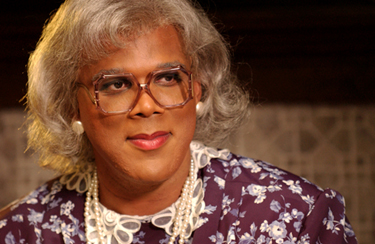

Reviews of Recent Independent, Foreign, & Documentary Films in Theaters and DVD/Home Video
Directed by: Darren Grant. Produced by: Tyler Perry & Reuben Cannon. Written by: Tyler Perry, based on his play. Director of Photography: David Claessen. Edited by: Terilyn A. Shropshire. Music by: Elvin Ross. Released by: Lions Gate. Country of Origin: USA. 116 min. Rated: PG-13. With: Kimberly Elise, Steve Harris, Shemar Moore, Tamara Taylor, Lisa Marcos, Tiffany Evans, Cicely Tyson & Tyler Perry.
Diary of a Mad Black Woman could have easily been called "A Woman
Scorned" or "Let Go, Let God," but whatever the name, the film can
definitely be hailed as joyous. Based on the popular stage play of the same
name, Diary is written and produced by Tyler Perry, who plays three of
the film's characters, most notably, the irreverent, pistol-packing
grandmother, Madea. The title character refers to Madea's granddaughter,
Helen McCarter (Kimberly Elise, Beloved) who suddenly finds herself
all on her own after her despicable excuse for a husband, Charles (Steve
Harris, TV's The Practice) literally throws her out of his life.
On the eve of their 18th Anniversary, Charles and Helen attend a special
awards dinner where Charles is being honored as lawyer of the year. He
thanks Helen in his acceptance speak and even leaves the podium to give her
a kiss, so it's all the more shocking when the couple pull up to their
palatial home and a U-Haul driver (Young and the Restless' Shemar Moore) is
loading Helen's stuff into the truck.
Even though Charles made her break all ties to her family - they didn't fit
into his plans to live the "American Dream" - they're the first ones Helen
turns to in her time of need, and Madea, more than anyone else, is glad to
welcome her back. It's funny in itself that Perry plays Madea, but the
scenes where Madea's forced to fire off a warning shot or take a chain saw
to Charles' furniture are truly hilarious.
As Helen works her way back from self-doubt, her situation is complicated by
her growing feelings for Orlando (the aforementioned U-Haul driver who, as
fate would have it, knows her family), and also by the feelings of revenge
that surface when Charles comes back into her life. Kimberly
Elise does a wonderful job expressing all of the confusion, resentment and
fear that any woman in her place would feel. And the camera loves her.
Whether she's letting loose a stream of tears, seething with rage at
Charles, or gazing lovingly into Orlando's eyes, there's a natural, raw
talent that can't be denied. The dialogue is quite clichéd at times and
Moore's performance is not always believable, but in the end the characters
are redeemed and the audience learns some lessons that are not new, but are
welcome nonetheless. Tanya Chesterfield
|